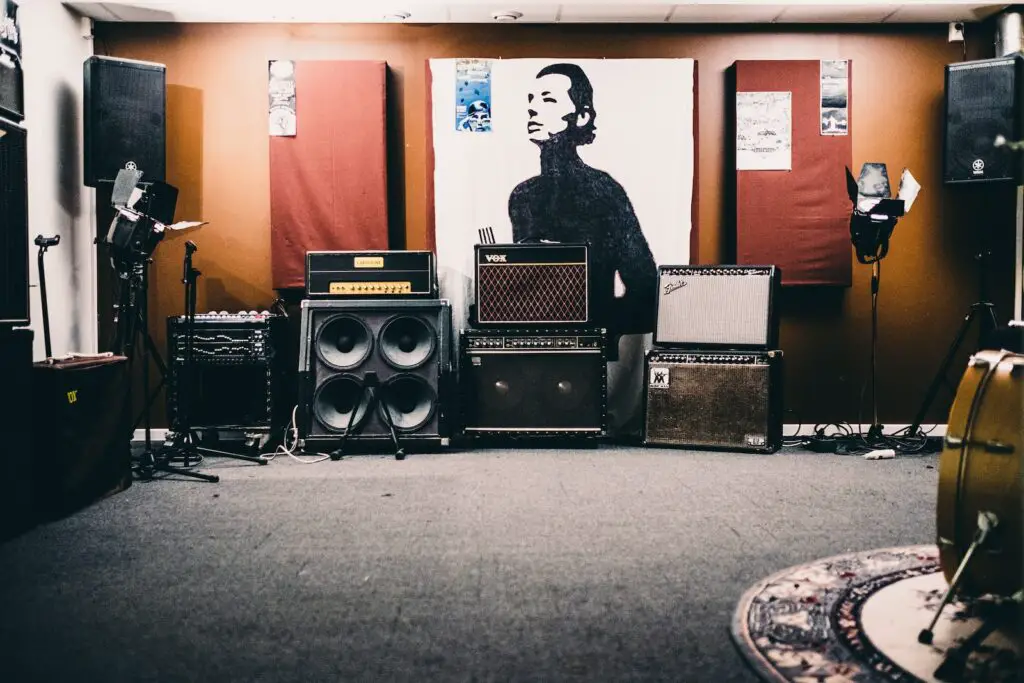Amplifiers are essential components of any audio system, amplifying the power of an audio signal so it can drive speakers or headphones.
Many amplifier users experience static noise or buzzing sound, which can be distracting and frustrating.
While the causes of static noise in amplifiers vary, it often stems from electronic interference, poor grounding or faulty wiring.
Sources such as nearby electronic devices or power sources can cause electronic interference.
Poor grounding may also contribute to static noise in an amplifier if it is not adequately grounded.
Faulty wirings, such as loose connections or damaged cables, may also result in static noise from an amplifier.
Unchecked static noise in an amplifier can significantly degrade the audio quality of your system and even damage speakers.
Important Reasons and Their Solution to the Amp Making Static Noise Or Buzzing Sound
Replug Guitar And Amp Cables
Try unplugging and replugging the connection jack between your guitar and amp to remedy a buzzing guitar amp.
An unstable connection with the audio jack can frequently cause the amp’s sound to become distorted.
Before inspecting the amp, ensure that your guitar is functioning properly. A defective connection between the guitar and the amp can often cause significant sound distortion.
Testing with another guitar can help identify whether there is an issue with your original guitar’s input jack or cable.
Take your amp to a guitar shop and have them test it with various guitars to get more insight into what might be wrong.
Replace The Cables
A bent cable can cause static noise, while a bare wire can exacerbate the issue. In such cases, a simple and inexpensive replacement cable can quickly eliminate guitar buzzing.
If you have an extra cable, try swapping it out and checking whether it resolves the buzzing issue.
Another method involves plugging the jack into the amp and pressing your thumb on the opposite end.
A buzz in the sound or static noise is usual, but crackling indicates a problem with the wire. Press your thumb on the connector jack while it’s connected.
The sound should remain consistent; any changes suggest a faulty cable or guitar jack.
Opt for sturdier and thicker cables with high-quality connector jacks that are less prone to bending or breaking when purchasing cables.
Check The Power Cord
An insufficient electric supply can cause an amp to buzz, often resulting from defective power cords.
To prevent this issue, use thicker cables to provide ample power to your amp.
Cables go through significant wear and tear and can go bad over time. Power cables typically experience two issues such as the cable or the connector is defective.
You must replace the power cord to determine whether the buzzing issue is resolved.
Before purchasing a new cable, check for a faulty cable by wiggling it while your guitar is connected to the amp.
This method is the same one used to identify issues with guitar connectors.
If the amp cable is in good working order, a defective power cable is the next most common cause of amp buzzing.
How Can I Reduce Static Noise In My Speakers?
To reduce static noise, ensure the speaker wires are correctly connected to both the speakers and the audio device.
By turning off nearby electronic devices that could disrupt sound quality, there are other steps you can take to reduce static noise from speakers.
Investment in more sophisticated noise reduction techniques, such as advanced shielding or signal processing techniques may be required to combat this problem.
These measures will minimize interference on speaker sound quality and offer a clearer, more enjoyable listening experience.
Can Static Noise Harm Speakers?
Over time, exposure to certain sounds, such as distortions, static, and other unpleasant noises, can damage speakers irreparably.
For maximum protection of your speakers, setting the volume to a moderate level is paramount.
Excessive loud music or prolonged exposure could cause undue strain and wear on components, eventually leading to damage or complete failure.
Maintaining your sound system at a moderate volume and avoiding prolonged exposure to loud sounds is recommended.
How Does Noise Cancelling Technology Relate To Static Noise?
Noise-cancelling headphones may produce a faint white noise or static sound that cannot be cancelled.
This is an inherent feature of their technology and does not have something to do with the headphones’ malfunctioning.
Mics pick up ambient noise and produce an opposite sound wave to cancel it out – leading to what sounds like white noise or static.
It is recommended to keep the volume low when using noise-cancelling features to minimize static noise.
Furthermore, high-quality audio cables and ensuring headphones are properly connected to an audio device can help further reduce static noise.
When using the Noise Cancelling function, it’s normal to hear a slight electrical noise followed by continuous static sound – known as white noise – which is an expected byproduct of their operation and doesn’t indicate any issues.
How To Prevent Amp Distortion?
Shielding materials like conductive foils or coatings may be beneficial in eliminating noise sources.
These materials can protect electronic signals from electromagnetic radiation interference. Furthermore, careful design of the circuit itself helps minimise noise levels.
For instance, placing sensitive components away from sources of interference or using high-quality components can reduce noise.
What Distorts The Sound Of My Amplifier?
Distortion in amplifiers can also be caused by faulty tubes, transistors, or other components that degrade over time.
Sometimes, an amplifier may be incorrectly biased, leading to an imbalance in signal flow and distortion.
Environmental elements like temperature or humidity can also wreak havoc on performance by amplifying output signals from speakers without amplifying them; the result is distorted sound quality.
Ensuring the amp and speakers are positioned correctly, and the cables are properly shielded to reduce interference is important.
The type of music being played and the volume level can also contribute to distortion.
Specific genres of music, such as heavy metal or hard rock, tend to have higher distortion levels than others.
Playing music at high volumes can also cause distortion, as the amplifier may struggle to handle the increased power output.





